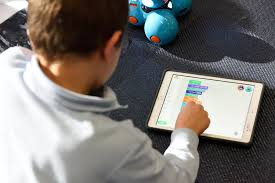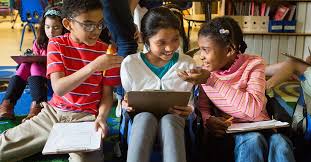What games can kids play on a laptop?
Here are 12 of the best computer games for kids that make our list.
- RollerCoaster Tycoon 3 by Frontier Developments.
- Lego Star Wars: The Complete Saga by Traveller’s Tales.
- Cuphead by StudioMDHR.
- Goosebumps: The Game by WayForward.
- Yooka-Laylee by Playtonic Games.
- Minecraft by Mojang.
- Roblox by Roblox Corporation.
What are some fun but educational games?
Elementary Online Educational Games
- ABCMouse. Offering a full curriculum for children ages 2-8, this site includes fun and interactive games, songs, and puzzles for reading, math, science, and art.
- Adventure Academy.
- Buzzmath.
- Camp Wonderopolis.
- Carmen Sandiego.
- Creativity Express!
- Duck Duck Moose Reading.
- FunBrain.
What are the five educational games?
Check out these five active educational games for kids:
- Sylla-balls.
- Letter Sound/Sight Word Road.
- Letter Sound Hopscotch.
- Sight Word/Letter Stomp.
- Numbers Bowling.
What games help with learning?
Top 5 “games” that help students learn
- Minecraft Edu – Minecraft for education is amazing.
- Matific – Matific is by far the best Mathematics based learning app / website I have seen.
- ClassCraft – Classcraft is a role-playing game designed to increase collaboration and engagement in the classroom.
What games can kids play on a laptop? – Additional Questions
Can games help kids learn?
Interaction and opportunities to make choices are among the virtues of the new generation of educational games, experts say. Games help us develop non-cognitive skills, which are as fundamental as cognitive skills in explaining how we learn and if we succeed, according to the panelists.
Do kids learn better through games?
According to research, using games in teaching can help increase student participation, foster social and emotional learning, and motivate students to take risks. One study of the popular multiple-choice quiz game Kahoot found that it improved students’ attitudes toward learning and boosted their academic scores.
Which game is best for a student?
Top 10 Classroom Games
- Charades. This simple but classic game is a great way to encourage your student to get out of their seats and participate in the lesson.
- Hangman.
- Scatter-gories.
- Bingo.
- Draw swords.
- Hot potato.
- Pictionary.
What activities can motivate students to learn more?
Additional Strategies for Motivating Students
- Become a role model for student interest.
- Get to know your students.
- Use examples freely.
- Use a variety of student-active teaching activities.
- Set realistic performance goals and help students achieve them by encouraging them to set their own reasonable goals.
What is the best activity for students?
15 active learning activities to energize your next college class
- Think-pair-repair. In this twist on think-pair-share, pose an open-ended question to your class and ask students to come up with their best answer.
- Improv games.
- Brainwriting.
- Jigsaw.
- Concept mapping.
- The one-minute paper.
- Real-time reactions.
- Chain notes.
Why are games important for students?
Research has shown that games are essential for healthy development in early childhood and beyond. Play lets children practise what they know, and also what they don’t. It allows them to experiment through trial and error, find solutions to problems, work out the best strategies, and build new confidence and skills.
How do games help children develop?
Research shows play can improve children’s abilities to plan, organize, get along with others, and regulate emotions. In addition, play helps with language, math and social skills, and even helps children cope with stress.
Should computer games be used to teach?
Scholars such as James Paul Gee, a longtime literacy professor, have repeatedly shown that video games can be used to facilitate learning in the K-12 classroom.
What are the benefits of games?
THE BENEFITS OF PLAYING VIDEOGAMES
- They speed up response times.
- They encourage teamwork.
- They stimulate creativity, focus and visual memory.
- They improve strategy and leadership.
- They teach languages.
- Critical thinking.
Why computer games are good for your child reading?
Reading. Studies show that kids who play video games may get a small boost to their reading skills. This is true even for kids who struggle with reading, and even when playing action games. Researchers think that this may happen because kids need to figure out text instructions to play.
Why do kids like games give two examples?
In addition, playing games teaches them important life skills and team spirit. It is an opportunity for them to socialize and make friends. Examples of two indoor games include chess and ludo and outdoor games include badminton, soccer etc.
What are the benefits of online games?
8 Benefits to Online Learning Games
- Computer Fluency.
- Develops Hand-Eye Coordination.
- Increase the Speed of Decision-Making and Problem-Solving.
- Absorb Information in a Fun Way.
- Improve and Encourage Creativity.
- Benefit Children with Attention Disorders.
- Increase Memory Capacity.
- Inspire New Interests.
How do kids learn with fun?
“Young children learn how things fit together through play. It allows them to use their senses and encourages exploration and curiosity, and these skills are the foundation of intellectual development and cognitive processing.” Play also inspires children to pretend, create, and imagine.
How can I make learning fun?
10 Tips for Making Learning Fun and Engaging For Children
- Break up Your Lessons. Many lessons involve lectures, especially when you’re introducing a new topic.
- Give Your Students Choices.
- Incorporate Games.
- Create Group Time.
- Get up and Move.
- Incorporate Hands-On Learning.
- Be Open to Creativity.
- Schedule Field Trips.
How can I make teaching fun?
How to Have More Fun Teaching
- Discover new things together.
- Incorporate mystery into your lessons.
- Be goofy; show you care.
- Participate in projects.
- Avoid “going through the motions.”
- Flip your lessons.
- Review–but don’t repeat–material.
- Share your passions.
How can I make my 7 year old learn fun?
Fun learning activities for 7-year-olds
- Language games.
- Phonic games.
- Memory games.
- Listening games.
- Action games.
- Tactile games.
- Screen games.
- Car journey games.
How do you attract students attention?
Tips for Getting and Keeping Attention
- Design hands-on lessons.
- Get your students up and moving.
- Vary participation structures and scenery.
- Use visuals often.
- Limit the amount of time you spend talking.
- Provide opportunities for cooperative learning.
- Allow your students to regularly share what they think.




